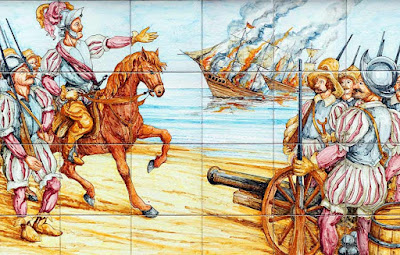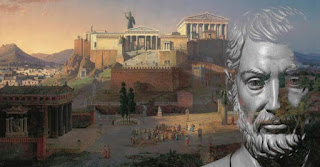 |
| Illustration by Pamela Zagarenski |
By Keith Tidman
The parable of The Blind Men and the Elephant originated on the Indian subcontinent around 500 BCE, from Buddhist, Hindu, and Jain sources, and afterwards spreading widely. The story is very simple: some blind men, for the first time in their lives, encounter an elephant and attempt to determine what kind of thing it is just through their sense of touch. But here’s the catch: their descriptions of the animal vary greatly, based on the particular part of the elephant each got to experience. The elephant has thus stood as a metaphor for reality.
Here, I offer a different take on the parable, raising the stakes by sampling historically rival ideas about reality. In my version, blindfolded philosophers similarly gather around an elephant, again each touching a different part: tusk, ear, head, trunk, leg, shoulders, tail, tongue, foot, and so forth. The philosophers describe the elephant based on their partial impressions. Each claims that their own description is the most accurate, despite their limited knowledge. That is, each philosopher extrapolates to what they presume to be the totality of reality, tending to discount the others’ descriptions.
What does this exercise tell us about what we empirically know regarding reality: especially subjectivity versus objectivity, and each philosopher’s role as presumed witness to reality? A matter as much about epistemology as about reality and truth. In this quest, how well can we get beyond faint apparitions, toward something more reified? Are we bound by principles of uncertainty? In the following discussions, I attempt to unspool several iconic philosophers’ reactions to touching isolated parts of the elephant, drawing on what we know about each philosopher’s historical framing of reality, truth, and theories of knowledge.
Thales: Feeling the elephant’s drenched tongue, Thales of Miletus (BCE) believes the experience confirms his conviction that water is the essential nature of reality — the single element from which all other things in the cosmos derive. The term used by the Hellenic philosophers to characterize that underlying, reality-revealing substance was arche, the original stuff from which the world came to be. For Thales, arche was water, whereas for other Ancients it was the air, or fire, or earth. Water as arche was demonstrated by the qualities of the elephant, based in objective, hard-and-fast materialism rather than in the mythology, lore, or religion of the day.
Plato: Feeling the elephant’s coarse back, Plato might believe the experience confirms his model of a dualistic reality. The dualism stems from there being an imperfect, sensory world of observations and a concurrently existing ideal world of immutable, timeless Forms (or Ideas). Plato considered Forms to be the highest manifestation of reality, from which he developed his theory of knowledge. Plato believed that true knowledge of reality emanates from understanding the Forms rather than derived from one’s bodily senses, like touch. To that extent, what people experience (perceive) in their day-to-day lives — in this case, the rough hide on the animal’s back — is but a flawed representation of ultimate reality — the whole elephant, as reality’s metaphor.
Thomas Aquinas: Feeling the large crown of the elephant’s head, Aquinas would conclude that the skull must contain a large, complexly structured brain. He would not doubt that this impressive head, and the brain it housed, must have been the evolving product of a succession of causes directed toward attaining perfection. This succession of causes and effects is traceable all the way back to the uncaused first cause or prime mover, which he defined as God. Aquinas viewed this striving toward excellence — the most fundamental aspects of being — as the natural order of the cosmos. For Aquinas, reality is split between essence (what makes the thing it is) and existence (the fact of being present in reality).
René Descartes: Perhaps feeling the elephant’s thick, pillar-like leg would convince Descartes that this thing was real, prompting him to ponder the fundamental nature of the object (the trunk of a tree or a column?) he was handling. In so doing, Descartes would be reminded that the acts of pondering and wondering are forms of human thought, which in turn would recall his axiom: I think, therefore I am. But also underpinning Descartes’ philosophy is something called mind-body dualism. That is, the idea that the mind (mental substance) is immaterial — from which “formal reality” emanates as an idea — while the body (in particular, the brain) is physical substance — from which “objective reality” emanates independent of the mind.
David Hume: In his case, feeling the hard-to-overlook enormous chest of the elephant, Hume might be reinforced in his staunch empiricism, observation, and skepticism. He might at the same time concede the entrenched limits of our knowledge, as well as uncertainty as to whether even rigorous inductive reasoning and investigation would be enough to confirm the true nature of external reality, in this instance the whole elephant. In this vein, Hume might split mental perceptions between ideas (thoughts) and impressions (sensations and feelings), making the argument that ideas are faint copies of impressions.
Immanuel Kant: Feeling the undulating tail of the elephant, and trying to figure out what it might be — a snake or stretch of rope, perhaps — Kant would surely remind himself to distinguish between phenomena (the world of appearances, derived from the innate structure of our minds) and noumena (the world of things as they truly are in themselves, independent of our minds). We can only know the world of phenomena, he would say, and not the external, objective nature of things, as the latter is beyond our cognitive capacity and thus unknowable. Kant would be puzzled, unable to fathom with clarity and certainty the essence of this rope-like thing that he intently grasped.
Georg Hegel: Feeling the elephant’s expansive shoulders, Hegel might be inspired to reflect on his metaphysics, grounded in idealism, which is that the utmost expression of reality actually stems from the mind, or what he labeled the “absolute spirit.” As the mind evolves, and self-awareness and knowledge of truth are gained, it does so channeled by a procedure he called dialectics. This starts with a hypothesis (the thesis), then leads to a counterargument (the antithesis), and concludes by reconciling the best of the two prior propositions (the synthesis). Hegel concludes that the synthesis of all the philosophers’ collective experiences with the elephant’s body parts would best reflect the physical world — the elephant in its meaningful entirety — that the philosophers were encountering.
Friedrich Nietzsche: Feeling the slowly waving ear of the elephant, Nietzsche might think that he was in contact with a fan. This would fit with his belief that reality is a matter of individual viewpoint, shaped by people’s instincts and interpretation of what they experience through the senses. This view was steeped in a denial of ultimate reality— of an objective, unchanging reality—but rather in empiricism and what Nietzsche referred to as the “will to power”: that is, the alluring urge to stamp reality with our own values, convictions, passions, and predispositions.
Ludwig Wittgenstein: In his case, feeling the hard tusk of the elephant, Wittgenstein might decide the object was a spear. That being said, he would choose with care the language to describe the object and its presumed functions, convinced that reality (our worldview) is shaped by the words, phrases, and logical structure of our language — bearing on what we think. As Wittgenstein pointed out, there is a direct correspondence between the limits of language, consisting of propositions that provide pictures of reality such as the whole elephant, and the limits of our understanding (perception) of facts and context-based reality. In other words, language’s meaning is derived from the societal and cultural conditions in which it’s used, differing among languages, which Wittgenstein referred to as “language games.”
Daniel Dennett: Finally, Dennett, the last of our philosophers, feels the trunk of the elephant, giving him the impression it is a tube through which materials pass. Manipulating the trunk to discern its function might fit nicely, for him, with his physicalist model of reality. Dennett considers that experience requires both consciousness and mind to happen, translatable through the neurophysiological operations of the brain. The brain, as the material seedbed of consciousness, relates to the reality of subjective experience. That is, the mind is not dualistically separate, mythically hovering apart from the brain as some have insisted. He believed science is a key path to better understand the processes involved. However, he acknowledges that experiences, like his contact with the trunk, do not always precisely mirror external reality, given the biased preconceptions about the reality and truth we harbor and which notionally influence us all.
I propose that the parable can be used in this manner to illustrate the diverse ways, over the centuries, that a sampling of key Western philosophers described the world. Some painted reality as subjective and empirically knowable, others as coming in both subjective and objective form, though they would be unsure how to parse the two. In every case here, there’s an instinctive yearn for symmetry between ultimate reality and the bounded information captured by the senses and curated and interpreted by the brain. Yet, beyond our sample, other philosophers argue that ultimate reality is opaque, obscure, and even changeable, and so to those extents it’s a reality that eludes certainty.






